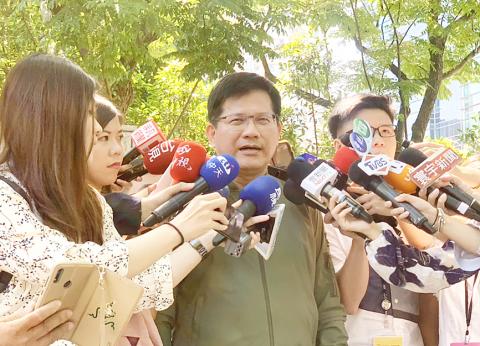China Airlines (CAL, 中華航空) yesterday said that it had recovered data going back to 2006 on the amount of cigarettes preordered for return flights of presidential state visits, although critics questioned the political implications of the growing scandal over cigarette smuggling, as key information was missing earlier.
CAL came under fire from Minister of Transportation and Communications Lin Chia-lung (林佳龍), Deputy Minister Wang Kwo-tsai (王國材), other officials and the public after a news conference on Thursday, when CAL chairman Hsieh Shih-chien (謝世謙) said that due to a computer system upgrade, the airline did not have information on cigarette preorders for presidential delegation return flights before 2013.
Critics said the airline was trying to limit the damage to the airline from the scandal.

Photo: CNA
Airline officials yesterday said that they had been able to trace 16 files containing figures from 2006 to 2013, and they would turn the files over to the Taipei District Prosecutors’ Office, which is investigating the scandal.
Those years would cover state visit flights during former president Ma Ying-jeou’s (馬英九) two terms, and the latter half of former president Chen Shu-bian’s (陳水扁) second term. Chen served from May 20, 2000, to May 20, 2008.
The files showed that 886 cartons and 10 cartons had been preordered for two of Ma’s presidential visits in 2015; 543 and 594 for two trips in 2013; 16 and 527 for trips in 2012; 22 and 1,683 for trips in 2010; and 331 and 74 from his 2009 state visits.
During two trips that Chen took before leaving office in 2008, 74 and 719 cartons were preordered, while 361, 481 and 417 had been ordered in 2007, and 119 were ordered when Chen toured six Pacific island nation allies in September 2006.
Lawmakers and critics earlier asked CAL about orders for Ma’s three state visits in 2015.
However, on Saturday the only figure made available was 2,973 cartons ordered for a trip in July 2015, which led some people to question if the data related to preorders had been deliberately erased to shield Ma.
CAL officials yesterday said the other two trips that Ma made in 2015 led to preorders of 886 and 10 cartons.
Prosecutors said they would verify CAL’s figures.
Democratic Progressive Party Legislator Hsi Chih-chieh (許智傑) yesterday said that the newly released airline data indicated that bypassing customs with duty-free preorders had obviously been going on for many years, and that members of the National Security Bureau and the Presidential Office, as well as other top government staff, had abused their authority.
“Bureau people and other top officials were greedy about these small sums for their own profit, but they were civil servants and have contravened the law, so this case must be thoroughly investigated and punishments handed out,” Hsu said.
“As of Saturday, the two files about preordered cigarettes during Ma’s state visits had gone missing. These could have been erased by CAL insiders for political motives,” Hsu said.
National Security Council Secretary-General David Lee (李大維) and Hsieh should resign, the lawmaker said.

CHAOS: Iranians took to the streets playing celebratory music after reports of Khamenei’s death on Saturday, while mourners also gathered in Tehran yesterday Iranian Supreme Leader Ayatollah Ali Khamenei was killed in a major attack on Iran launched by Israel and the US, throwing the future of the Islamic republic into doubt and raising the risk of regional instability. Iranian state television and the state-run IRNA news agency announced the 86-year-old’s death early yesterday. US President Donald Trump said it gave Iranians their “greatest chance” to “take back” their country. The announcements came after a joint US and Israeli aerial bombardment that targeted Iranian military and governmental sites. Trump said the “heavy and pinpoint bombing” would continue through the week or as long

TRUST: The KMT said it respected the US’ timing and considerations, and hoped it would continue to honor its commitments to helping Taiwan bolster its defenses and deterrence US President Donald Trump is delaying a multibillion-dollar arms sale to Taiwan to ensure his visit to Beijing is successful, a New York Times report said. The weapons sales package has stalled in the US Department of State, the report said, citing US officials it did not identify. The White House has told agencies not to push forward ahead of Trump’s meeting with Chinese President Xi Jinping (習近平), it said. The two last month held a phone call to discuss trade and geopolitical flashpoints ahead of the summit. Xi raised the Taiwan issue and urged the US to handle arms sales to

State-run CPC Corp, Taiwan (CPC, 台灣中油) yesterday said that it had confirmed on Saturday night with its liquefied natural gas (LNG) and crude oil suppliers that shipments are proceeding as scheduled and that domestic supplies remain unaffected. The CPC yesterday announced the gasoline and diesel prices will rise by NT$0.2 and NT$0.4 per liter, respectively, starting Monday, citing Middle East tensions and blizzards in the eastern United States. CPC also iterated it has been reducing the proportion of crude oil imports from the Middle East and diversifying its supply sources in the past few years in response to geopolitical risks, expanding

Pro-democracy media tycoon Jimmy Lai’s (黎智英) fraud conviction and prison sentence were yesterday overturned by a Hong Kong court, in a surprise legal decision that comes soon after Lai was jailed for 20 years on a separate national security charge. Judges Jeremy Poon (潘兆初), Anthea Pang (彭寶琴) and Derek Pang (彭偉昌) said in the judgement that they allowed the appeal from Lai, and another defendant in the case, to proceed, as a lower court judge had “erred.” “The Court of Appeal gave them leave to appeal against their conviction, allowed their appeals, quashed the convictions and set aside the sentences,” the judges